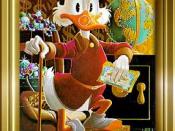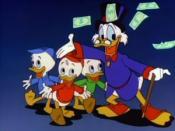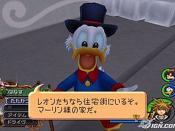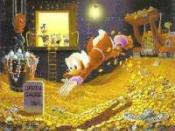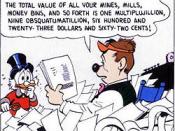How to Watch Duck Tales What ensures capitalism as the dominant economic system in the world? Is it the fact that capitalism is the best system, or is it because capitalism is the only system dictated to be suitable? Disney, the leading proponent of capitalism, has spread its propaganda all across the globe in the form of innocent cartoons. This dogma of what you get is what you deserve has been and continues to be pounded to third world countries. The author's of the book How to Read Donald Duck, Ariel Dorfman and Armand Mattelart, understood how this ideological monster worked. They uncovered the underlying message of Disney's cute cartoons and elicited the truth behind the mouse ears. These capitalistic ploys are never so evident as seen in the popular kid's cartoon Duck Tales. The main character of the show, Scrooge McDuck, is a self-made millionaire with the knack of making money and holding on to it.
He is a protagonist without any good qualities, yet people adore him, or more so they adore his money. The Duck Tale's episodes reinforce the dominant capitalist ideology by elevating the importance of money itself, showing how people who are poor deserve the state in which they were in, and how the rich deserve their position in society.
Scrooge McDuck's lust for money is a reoccurring theme in Duck Tales. The show is basically all about money, the acquisition of money and the retention of money. Even though the subject matter sounds very uninteresting to a person without money, the show is masked under the guise of a kid's show. Appealing to children, the show follows the life of a millionaire and his three young nephews. The episodes are adventures in which Scrooge McDuck is on a never-ending conquest to obtain more riches. The show makes children want to live the lifestyle enjoyed by Scrooge's three nephews. And the only way to live such a lavish lifestyle is to have money. Money is elevated to a higher level, only the good guys in the cartoon have money, and the bad guys, the Beagle Boys, and Magica DeSpell, don't have money. The show tries to correlate possessing money with the characteristic of being a good person, and not having money as being a bad person. Thus the show is saying something about capitalistic society; success is measured by how much money you have in spite of the fact that the wealth may have come from an unsavory source.
The more detrimental aspect of the show is what is being said about who does and who does not deserve money. When Scrooge scours the world for riches it often takes him to far off lands. In these lands, Scrooge encounters the local population; they are often in his way of obtaining the treasure he seeks. Scrooge will use any means to obtain the treasure, often tricking the locals. The show's justification for Scrooge taking the treasure is that the "wealth is left without heirs; despite their total poverty, the noble savages take no interest in the gold abounding so near them"(530). The Locals deserve their poverty; they have no need for the riches and probably would not know what to do with the treasure if it came into their possession.
The natives depicted in the Duck Tales episodes represent third world countries, and the Duckbergers represent America. The treasures are actually the countries natural resources. The show justifies the plundering of other countries natural resources in the same manner that it justifies Scrooge's plundering of the native's treasures. Even though the third world countries actually sell their resources, they don't have much of a choice if they want to sell them or not, or what price they will sell it at. I doubt an oil producing Middle Eastern country can deny the sale of oil to the United States. The reasons the third world countries are poor is because of the capitalistic structure of the global economy, not everyone can be rich in capitalism. Countries that try to alleviate their staggering economic situation by borrowing funds from the international bank, but the country just incurs more debt. This system appeals to people with money. It is entities like Disney that try to make it appeal to everyone.
Scrooge's greatest fear is to lose his money. His wealth is synonymous with his identity, losing his money would be like losing his soul. The show argues that Scrooge deserves all of the money he has amassed, even though portions of it have came from the expense of others. To want Scrooge's money is wrong; a person should earn it using his or her own means. Children see Scrooge on countless occasion's turn down people begging for money, even though he has great excess and they are in dire need. This reinforces the capitalistic idea of what a person has is what he or she deserves. There is not enough wealth to go around, upper class society must keep a firm grasp on their money. The show makes bourgeoisie society appealing to all of its viewers, in spite of the fact that many viewers will never see the likes of it.
The Dorfman and Mattelart essay elucidates the persuasive and sometimes dangerous nature of Disney comics. Disney is shaping the minds of the impressionable third world inhabitant by convincing him or her of the validity of their poor social situation. On an even more hazardous level, Disney has taught the lower class to accept their lowly state. Dorfman and Mattelart point out "harm in dreaming the dream of a particular class as if it were the dream of the whole of humanity"(534). Creating one dream for both the lower and upper classes ensures the positions both classes are within. The lower class will strive to gain wealth but will accept their inefficiency to do so as a deficiency in themselves and not in the capitalistic system. Facets of capitalism reinforced by Duck Tales ensures the viewers of the show will dream this dangerous dream without ever comprehending they are doing so.
